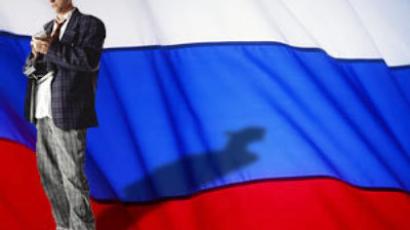Tears of Ossetian children mean nothing to Western media
A year ago a story on Georgia’s war against South Ossetia filmed by a Russian cameraman was silenced on Polish TV because it was out of tune with the politicized official media line in the country.
Today’s diverse range of media sources should enable a more objective portrayal of global news events, but in reality, objectivity often loses out to politics.
Viktor Bater learned this the hard way.
“My cameraman came back from South Ossetia, showed me his footage and told me exactly what he’d seen, what had gone on there. So we put together a report and sent it to Warsaw. My bosses were outraged – how could we make such an anti-Georgian story? – and promptly shelved the report,” recalls Bater, a well-known former reporter for Polish state TV TVP in Moscow.
The only biased thing about Viktor’s report was that he portrayed the war as it was.
“It was just war. My cameraman showed what he saw: Georgian attacks, the fear and pain of the Ossetians caught under fire,” stated Bater. “But of course, this was not in line with TVP’s then-editorial policy, which was dictated by the President and the fact he was, and still is, a very close friend of Mikheil Saakashvili.”
But this kind of honesty cost Viktor his job.
After this, he was formally kept on for a while, but had no chance to work and then got a letter from Poland telling him his contract had been terminated.
RT tried to get in touch with TVP to get their side of the story, and received the following reply from Jan Pinski, Information Agency Director of TVP S.A.
“The job contract with Mr Viktor Bater has been terminated at the request of the former TVP Information Agency Director Janusz Sejmej. It was a short-term contract. This was explained as an economic decision. The channel had another correspondent in Russia.”
According to some rumors, other issues included Viktor’s Abkhazian wife, Shazi.
“I saw how upset he was – we both were. TVP was the only foreign channel that was on Ossetian territory then, and they did not want to show what was happening,” said Shazi Bater. “And the fact that my husband stuck to the truth, and spoke out – that is right. I believe in him, in his talent and know he will find his place in the sun.”
Viktor was not the only one to suffer from editorial politics surrounding the conflict in South Ossetia.
Pavel Kassin worked for German weekly Der Spiegel for 18 years. After the war in South Ossetia, however, he was fired for sending in photos that showed the results of Georgia's military aggression.
“I sent in 20 odd photos to Hamburg. And none of them made it to press. After 18 years of work, it’s a little hard to believe that someone suddenly is unhappy with the quality of your photos,” said a surprised Kassin, before adding “Look at the photos they published: burnt Georgian tanks, some Georgian soldiers detained by Russian troops. It is a completely one-sided portrayal of events.”
In a time of universal deceit, telling the truth becomes a revolutionary act and while these “revolutionaries” have lost the battle, they are still fighting the war.













